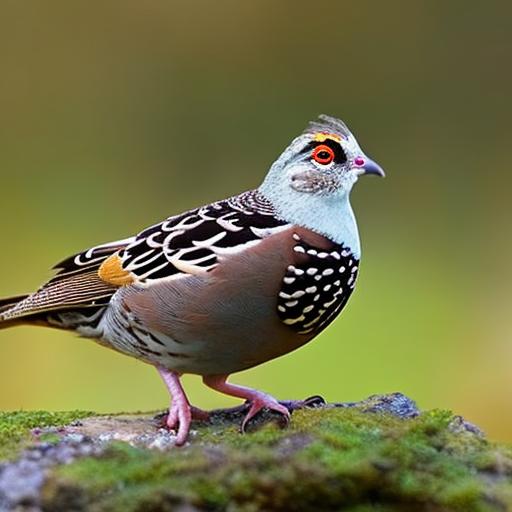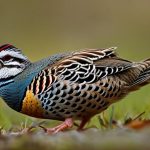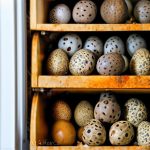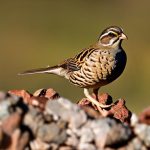Japanese Painted Quail, also known as Coturnix chinensis, are small, ground-dwelling birds that are native to East Asia. They are popular among avian enthusiasts for their colorful plumage and charming personalities. These quails are often kept as pets or for their eggs and meat. Japanese Painted Quail are relatively easy to care for and can thrive in a variety of environments, making them a great choice for both novice and experienced bird keepers.
Japanese Painted Quail are known for their striking appearance, with a combination of vibrant colors and intricate patterns on their feathers. They come in a variety of color mutations, including tuxedo, silver, golden, and cinnamon, making them a visually appealing addition to any aviary or backyard. These quails are also known for their friendly and sociable nature, often forming strong bonds with their human caretakers. They are active and curious birds, constantly exploring their surroundings and interacting with their environment. With the right care and attention, Japanese Painted Quail can live up to 5 years in captivity, providing years of enjoyment for their owners.
Key Takeaways
- Japanese Painted Quail are small, colorful birds native to East Asia and are popular as pets due to their low maintenance and peaceful nature.
- When housing Japanese Painted Quail, it is important to provide a secure enclosure with plenty of space for them to move around and explore.
- A balanced diet for Japanese Painted Quail includes a mix of seeds, grains, greens, and protein sources such as mealworms or small insects.
- Socialization and enrichment are important for the well-being of Japanese Painted Quail, and they should be kept in pairs or small groups to prevent loneliness.
- Regular health check-ups and access to a qualified avian veterinarian are essential for maintaining the health and well-being of Japanese Painted Quail.
Housing and Enclosure Requirements
When it comes to housing Japanese Painted Quail, it’s important to provide them with a safe and comfortable environment that meets their specific needs. A spacious enclosure is essential to allow these active birds to move around freely and engage in natural behaviors such as dust bathing and foraging. A minimum of 1 square foot of space per bird is recommended, with additional space for each additional quail. The enclosure should also be escape-proof, as these small birds are skilled at finding gaps and openings to explore outside of their designated area.
The flooring of the enclosure should be covered with a soft substrate such as sand or wood shavings to mimic the quail’s natural habitat and provide a comfortable surface for walking and dust bathing. Additionally, providing hiding spots such as small shelters or plants can help reduce stress and provide a sense of security for the quails. It’s important to regularly clean the enclosure to maintain a healthy living environment for the birds, as they can be susceptible to respiratory issues if exposed to high levels of ammonia from accumulated waste. Lastly, the enclosure should be located in a quiet area away from potential predators and extreme weather conditions, ensuring the safety and well-being of the quails.
Diet and Nutrition
Proper nutrition is essential for the health and well-being of Japanese Painted Quail. A balanced diet should consist of a high-quality commercial quail feed supplemented with fresh fruits, vegetables, and protein sources. The commercial feed should contain a mix of grains, seeds, and essential vitamins and minerals to meet the quail’s nutritional requirements. Additionally, offering a calcium supplement such as crushed oyster shells or eggshells can help prevent calcium deficiencies, especially in female quails that are laying eggs.
Fresh fruits and vegetables should be offered daily to provide essential vitamins and fiber to the quails’ diet. Some suitable options include leafy greens, carrots, berries, and melons. Protein sources such as mealworms, crickets, and boiled eggs can be offered as treats or as part of the regular diet to ensure the quails receive an adequate amount of protein for muscle development and overall health. It’s important to provide clean, fresh water at all times, as quails can quickly become dehydrated if water is not readily available. By offering a varied and nutritious diet, Japanese Painted Quail can thrive and maintain optimal health in captivity.
Socialization and Enrichment
Japanese Painted Quail are social birds that thrive in the company of their own kind. It’s recommended to keep these quails in small groups of at least 3-4 individuals to prevent loneliness and encourage natural social behaviors. Providing ample space within the enclosure allows the quails to establish a pecking order and form strong social bonds with their flock mates. Additionally, introducing enrichment activities such as perches, dust bathing areas, and foraging toys can help stimulate the quails’ natural instincts and prevent boredom.
Offering a variety of perches at different heights within the enclosure allows the quails to exercise and explore their environment while also providing them with a place to rest and observe their surroundings. Dust bathing areas filled with fine sand or dusting powder should be provided to allow the quails to engage in this important grooming behavior. Foraging toys such as puzzle feeders or scattered treats encourage the quails to search for food, keeping them mentally stimulated and engaged. Regular interaction with their human caretakers can also provide social enrichment for Japanese Painted Quail, helping them feel comfortable and secure in their environment.
Health and Veterinary Care
Maintaining the health of Japanese Painted Quail requires regular monitoring and preventive care. It’s important to observe the quails daily for any signs of illness or injury, such as lethargy, abnormal droppings, or changes in appetite. Providing a clean living environment with proper ventilation and low stress levels can help prevent common health issues such as respiratory infections and parasites. Regularly cleaning the enclosure and providing fresh water and food can also contribute to the overall health of the quails.
In the event of illness or injury, it’s important to seek veterinary care from a professional experienced in avian medicine. A qualified veterinarian can provide a thorough examination of the quails and recommend appropriate treatment options to address any health concerns. Additionally, routine vaccinations and parasite control measures may be recommended by a veterinarian to prevent common diseases and infestations. By staying proactive about the health care of Japanese Painted Quail, owners can ensure that their birds remain healthy and happy for years to come.
Breeding and Reproduction

Breeding Japanese Painted Quail can be a rewarding experience for avian enthusiasts interested in expanding their flock or producing offspring for sale or exhibition. Before attempting to breed quails, it’s important to ensure that the breeding pair is healthy, well-nourished, and housed in a suitable environment that meets their specific needs. Providing a separate breeding enclosure with nesting boxes or shelters can help create a conducive environment for successful reproduction.
Japanese Painted Quail are prolific layers, with females capable of laying up to 12 eggs in a clutch. The eggs typically hatch within 16-18 days after being laid, with the chicks being independent and able to feed themselves shortly after hatching. It’s important to provide proper nutrition for breeding pairs, including a diet rich in protein and calcium to support egg production and chick development. Additionally, monitoring the breeding pair for any signs of aggression or stress can help ensure a successful breeding experience.
Legal Considerations and Regulations
Before acquiring Japanese Painted Quail, it’s important for potential owners to research and understand any legal considerations or regulations related to keeping these birds in their area. Some regions may have specific requirements or restrictions regarding the ownership of quails, including permits or licenses that may be necessary to keep them legally. Additionally, it’s important to consider local zoning laws and homeowner association regulations that may impact the ability to keep quails on residential properties.
By familiarizing themselves with any legal considerations or regulations related to Japanese Painted Quail ownership, individuals can ensure that they are in compliance with local laws and avoid potential legal issues or penalties. Seeking guidance from local authorities or avian organizations can provide valuable information regarding the legal requirements for keeping quails in a specific area. By staying informed about legal considerations and regulations, owners can enjoy their experience of keeping Japanese Painted Quail while also adhering to applicable laws and regulations.
In conclusion, Japanese Painted Quail are delightful birds that can bring joy and entertainment to avian enthusiasts of all levels of experience. By providing proper housing, nutrition, socialization, health care, and enrichment opportunities, owners can ensure that their quails lead happy and fulfilling lives in captivity. Understanding legal considerations and regulations related to quail ownership is also essential for maintaining compliance with local laws while enjoying the company of these charming birds. With proper care and attention, Japanese Painted Quail can thrive in captivity and provide years of companionship for their human caretakers.
If you’re interested in keeping Japanese painted quail, you may also want to explore the article on “The Chicken Coop Country Diner” on PoultryWizard.com. This article provides valuable insights into creating a comfortable and functional living space for your quail, which is essential for their well-being and productivity. Check out the article here to learn more about creating an ideal environment for your quail.
FAQs
What are Japanese painted quail?
Japanese painted quail, also known as Coturnix chinensis, are small ground-dwelling birds native to East Asia. They are popular as pets and are known for their colorful plumage and distinctive calls.
What do Japanese painted quail eat?
Japanese painted quail are omnivorous and eat a variety of foods including seeds, insects, fruits, and vegetables. In captivity, they can be fed a diet of commercial quail feed, supplemented with fresh greens and protein sources.
How do you house Japanese painted quail?
Japanese painted quail are best housed in a spacious aviary or enclosure with plenty of room to move around. The enclosure should have a solid floor to prevent injury to their delicate feet and should be equipped with perches, hiding spots, and nesting boxes.
What are the ideal living conditions for Japanese painted quail?
Japanese painted quail thrive in a warm and dry environment. They are sensitive to cold temperatures and should be kept in a well-ventilated area with access to natural light. The enclosure should be kept clean and free from drafts.
How do you care for Japanese painted quail?
Caring for Japanese painted quail involves providing them with a balanced diet, clean water, and a suitable living environment. Regular monitoring of their health and behavior is important, and they should be handled gently to minimize stress.
Can Japanese painted quail be kept with other birds?
Japanese painted quail can be kept with other small, non-aggressive bird species in a mixed aviary. However, care should be taken to ensure that all birds have adequate space and that there are no territorial disputes. It is best to avoid housing them with larger or more aggressive bird species.
Meet Walter, the feathered-friend fanatic of Florida! Nestled in the sunshine state, Walter struts through life with his feathered companions, clucking his way to happiness. With a coop that’s fancier than a five-star hotel, he’s the Don Juan of the chicken world. When he’s not teaching his hens to do the cha-cha, you’ll find him in a heated debate with his prized rooster, Sir Clucks-a-Lot. Walter’s poultry passion is no yolk; he’s the sunny-side-up guy you never knew you needed in your flock of friends!







